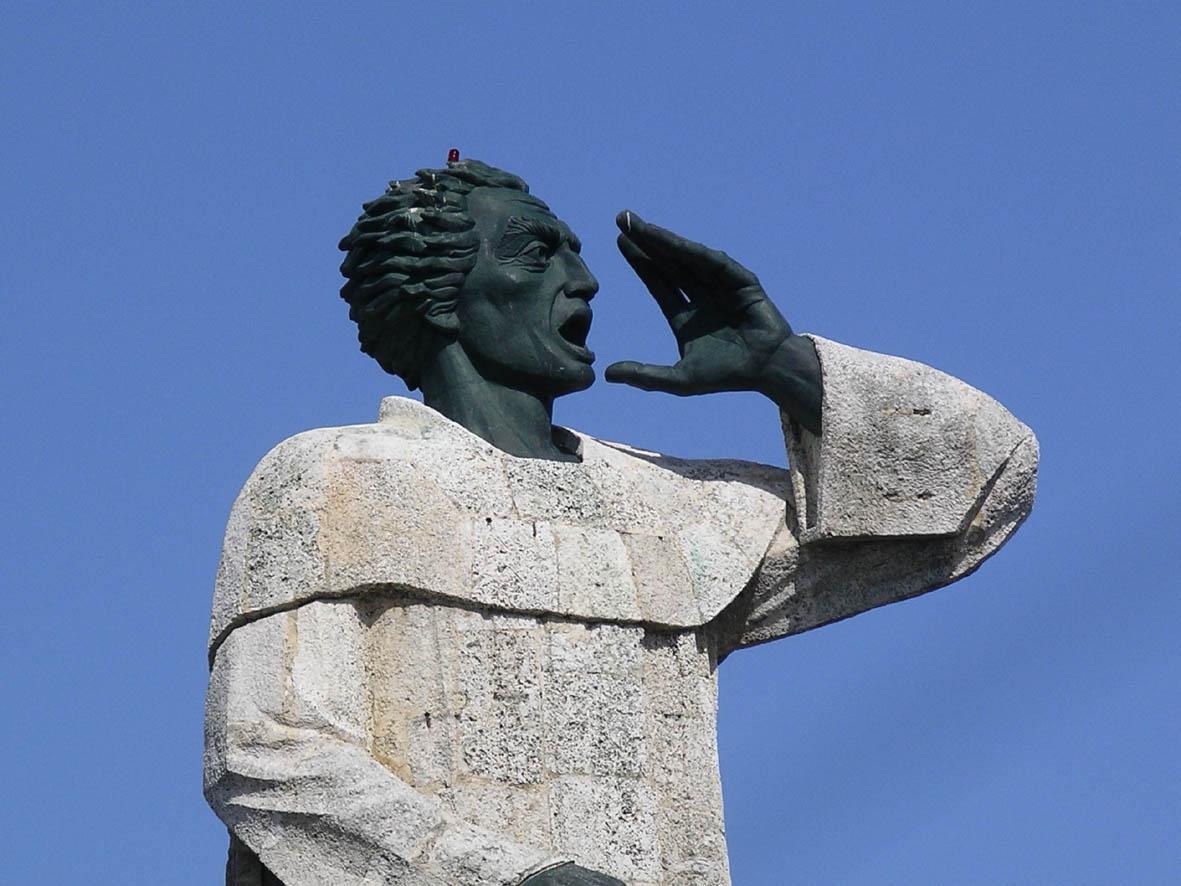by Ken Sehested
Six year before Luther commenced his Ninety-Five Theses’ complaint with the Roman church, another priest scandalized the colonizing Spanish authorities with a sermon.
It was the fourth Sunday of Advent, 1511—half a millennium ago—on the island of Española (modern Haiti and Dominican Republic). Three years prior, three Dominican monks had arrived as Spain’s first missionaries to the territory.

One day a stranger appeared at their door. Earlier he had committed a crime of passion, but was now returning—penitent, desiring entrance into the Order as a novice—from years of hiding in the mountains.
Right: Statue of Fr. Antonio Montesinos, Santo Domingo, Dominican Republic
Offering customary hospitality, the monks then heard first-hand accounts of Spanish soldiers’ cruel and bloodthirsty treatment of the native Taino people, forcing them to work as Spanish agricultural slaves and mining gold. Whole villages had been plundered. The rape of women was pandemic. Dogs were often employed by the conquistadors to hunt escapees.
These accounts of Spanish brutality weighed heavily on the Friars’ minds. After much prayer and conversation, it was agreed that a protest must be issued. They chose their most eloquent preacher, Antonio Montesinos, to voice a rebuke.
Montesinos’ text for the day was that clarion call from John the Baptizer, “The voice of one crying in the wilderness” (Matthew 3:3). This voice, Montesinos declared to the gathered colonial authorities, is that “all of you are in mortal sin and you live and die in it due to the cruelty and tyranny which you practice with this innocent people. Tell me by what right and with what justice do you hold these Indians in such horrible servitude? With what authority have you waged such detestable war, bringing havoc and death never before seen on these people who were living peacefully and calmly on their lands?”
You can imagine the reaction.
How dare this humble priest disrupt our season of Christmas cheer with such accusations! Sure, collateral damage is an unfortunate side effect in the pursuit of national security. But stuff happens. In any case, we don’t need preachers wandering away from spiritual matters into commentary on counterinsurgency policies!
Montesinos was accused of subversion. That very afternoon colonial authorities went to the Friars’ communal house demanding a retraction. It would not come. In fact, the following Sunday Montesinos’ superior ordered him back into the pulpit to elaborate on the previous Sunday’s call to repentance.
The church-state dispute then migrated back to Spain where Montesinos argued his case against Española’s Coalition Provisional Authority at the King’s court in Madrid. A transcript of their case is recorded in the 1512 Laws of Burgos, the Spanish court’s first provision of modest protections for the “Indians” from the worst forms of colonial abuse.
On that fateful December 21, 1511 mass, it’s highly unlikely that Montesinos was aware of the influence his sermon would have on Bartolemé de Las Casas, among the many slave owners to hear Montesinos’ sermon. Las Casas would later free his slaves when he joined the Dominican Order and became the leading critic of European colonial rule in the Americas. He is credited with convincing the Spanish Crown to issue the 1542 “New Laws” designed to protect indigenous peoples in the Americas from rapacious economic forces. Though in subsequent years the laws were minimally enforced, the case served to secure the dangerous testimony which Montesinos and las Casas and other theological dissenters represent among the cloud of witnesses still available for the renewal of the church’s Advent story.
For those with ears to hear, the angle on Advent just got sharper.
# # #

